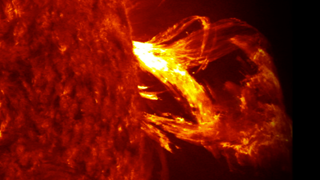Greatest Hits
Ever since NASA's Solar Dynamics Observatory (SDO) began collecting images in April 2010, it has delivered incredible views of the sun ranging from stunning to downright explosive. In the past two years, the sun generated more than 1,000 outbursts, including solar flares, coronal mass ejections and energetic particles that travel to the edge of the solar system. By recording these events in multiple wavelengths, scientists can unravel the process by which the roiling magnetic fields inside and around the sun cause it to erupt. For example, the above image showing light at 171 Angstroms and colorized in gold reveals the looping arcs of particles that coalesce around magnetic field lines in the sun's atmosphere during intense periods of solar activity. Other wavelengths make different features more readily visible to the human eye. Watch the video below highlighting some of the most amazing moments witnessed by SDO in its second year of operation.

A breathtaking compilation of solar views you don't want to miss.
The detailed images recorded by SDO over the last year have helped scientists uncover new secrets about the sun.

April 21, 2012 marked the two-year anniversary of SDO's first released images, such as this one that shows a combined view of multiple wavelengths.

At 211 angstroms, the soft glow of the sun's corona becomes apparent.

Dark plasma rains down over nearly half of the sun's surface, shown above at 304 angstroms, following an explosion on June 7, 2011.

Scientists view images at 131 angstroms to study solar flares, such as this X-class flare that took place on March 5, 2012.
For More Information
See NASA.gov
Credits
Please give credit for this item to:
NASA's Goddard Space Flight Center
-
Animators
- Tom Bridgman (Global Science and Technology, Inc.)
- Steele Hill (Wyle Information Systems)
-
Video editor
- Genna Duberstein (USRA)
-
Producer
- Genna Duberstein (USRA)
-
Writer
- Karen Fox (ADNET Systems, Inc.)
Release date
This page was originally published on Thursday, May 10, 2012.
This page was last updated on Wednesday, May 3, 2023 at 1:53 PM EDT.
